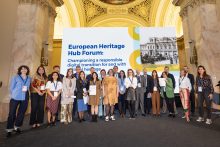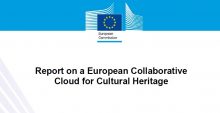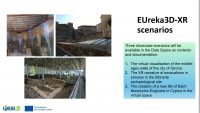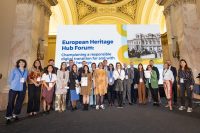PRESS RELEASE – 14th December 2020
Today, the Commission has welcomed the political agreement reached between the European Parliament and EU Member States on the new Creative Europe programme (2021‑2027). Trilogue negotiations have now concluded, pending the final approval of the legal texts by the European Parliament and the Council.
Commissioner for Innovation, Research, Culture, Education and Youth, Mariya Gabriel said: “I welcome the political agreement on the new Creative Europe programme. The programme has been critical for promoting Europe’s cultural diversity as well as the competitiveness of cultural and creative sectors. Now it has been modernised to better equip these sectors to face today’s challenges, including those brought about by the pandemic.”
Commissioner for Internal Market Thierry Breton noted: “The culture and creative ecosystem continues to be deeply affected by the current crisis. Today’s agreement is an important signal for all European media partners, small and big, and all our creators, at a time when they need our support more than ever before. Creative Europe is an essential tool for further digitalisation and internationalisation of these key sectors. It will also strengthen the resilience of our media and audiovisual industry and reinforce media freedom and pluralism across the European Union.”

Creative Europe banner – moving dancers. EACEA website.
The Creative Europe programme is the flagship instrument in support of the cultural and creative sectors – and the only one designed by the EU to support them specifically.
With a dedicated budget of more than €2.4 billion, made up of €1.8 billion in current prices and an additional top-up of €0.6 billion in 2018 prices, the new programme will continue to promote cultural and linguistic diversity, heritage and competitiveness, and will allow cultural and creative organisations and professionals to co-create and cooperate across borders and to reach wider audiences, tackling current societal questions and supporting emerging artists. The MEDIA strand will keep supporting projects with a European dimension and an international one; as well as nurturing talent and supporting the use of new technologies to strengthen the competitiveness of the sector.
For the first time, the news media sector will be supported throughout different actions promoting media literacy, pluralism and media freedom under the cross-sectoral strand.
Next steps
Implementation of the new programme is planned for early 2021. The new programme will run until 2027.
On 10 November 2020, a political agreement was reached between the European Parliament, EU Member States in the Council as well as the Commission on the next long-term EU budget and NextGenerationEU. As a next step, the legal adoption of the MFF package along with the ratification of the Own Resources Decision is now urgently needed.
Once adopted, the EU’s long-term budget, coupled with the NextGenerationEU initiative, which is a temporary instrument designed to drive the recovery of Europe, will be the largest stimulus package ever financed through the EU budget. A total of €1.8 trillion* will help rebuild a post-COVID-19 Europe. It will be a greener, more digital and more resilient Europe.
(*in 2018 prices)
For More Information






 If you have interesting news and events to point out in the field of digital cultural heritage, we are waiting for your contribution.
If you have interesting news and events to point out in the field of digital cultural heritage, we are waiting for your contribution.































